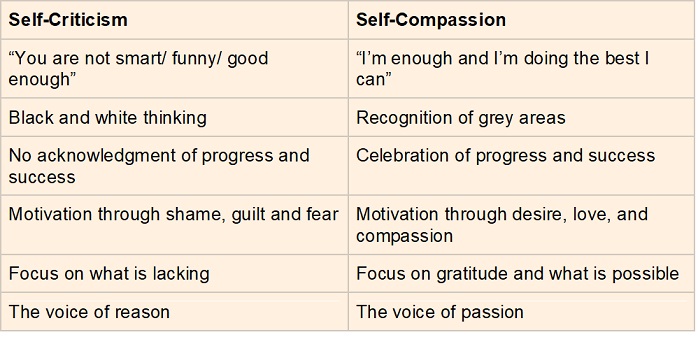A Research Paper By Anna Schwaiger, Life Coach, CANADA

Why We Want to Achieve Success
We live in a world that strives for success. Early on, we learn that we need to be successful in school, work, relationships, and life to be happy. We are constantly trying to perfect ourselves, be better, smarter, stronger, prettier, and wiser. We never stop because there is always something else we could do to make more of ourselves. “Neuroscience confirms that to be truly happy, you will always need something more.”[1] It seems as if humans are in never-ending development and learning. And we want to be successful in it.
What Is Success?
By definition, success is “the favorable or prosperous termination of attempts or endeavors; the accomplishment of one’s goals.”[2] According to this definition, every one of us experiences success every day, but we’re seldomly aware of it. Probably because “most people associate success with money and that they must “climb the corporate ladder” to be successful.”[3]
Coming from a Social Work background, I’ve watched my clients having all kinds of successes:
- Showing up for an appointment after several attempts
- Finding a job after years of trying
- Learning how to dress themselves
- Managing to stay sober
- Opening up a very first bank account at the age of 85
- Managing daily life with disabilities and mental health problems
- Being able to get out of bed in the morning
- Moving into an apartment after living on the streets
- Accepting help
I’ve seen many people having smaller and bigger successes every day, but what I’ve rarely seen is an acknowledgment of their success. We are so used to striving for more that we don’t even recognize when we’ve accomplished something. Instead, we take it for granted.
A recent article on upjourney.com asked 35 people from various backgrounds – successful coaches, authors, CEOs, entrepreneurs, etc. for answers to the question, “What is success?” Looking through their statements, it became apparent to me that their perspectives can be summarised as:
- Success is feeling your success
- Success is individual
- Success is work
 [4]In summary, success is an individual, active process which involves goal setting, goal achievement, and acknowledgment. For a person with depression, getting out of bed in the morning can be a success. For a high-achieving manager, landing another Million Dollar projects can be a success. Both persons have success, but there is a judgment which accomplishment is worth celebrating, rooted in our upbringing, culture, and society.
[4]In summary, success is an individual, active process which involves goal setting, goal achievement, and acknowledgment. For a person with depression, getting out of bed in the morning can be a success. For a high-achieving manager, landing another Million Dollar projects can be a success. Both persons have success, but there is a judgment which accomplishment is worth celebrating, rooted in our upbringing, culture, and society.
In the next chapter, I will focus on the celebration of success and what makes it hard for many people to feel and acknowledge their accomplishments.
Celebrating Success
“Any celebration, big or small, is really about taking a beat to notice the good stuff in your life. It can also be a reminder of our talents and abilities, skills, and persistence. Drawing on those things can motivate us to keep working toward our goals.”[5]
Seeing, feeling, and celebrating our success means acknowledging our worth. It is an essential part of showing ourselves kindness, love, and compassion. “Compassion is the ability to show empathy, love, and concern to people who are in difficulty, and self-compassion is simply the ability to direct these same emotions within, and accept oneself, particularly in the face of failure.”[6]
Many studies show how self-compassion can be beneficial for our mental health and well-being. Being kind and understanding, especially when struggling, leads to less depression, anxiety, stress, and shame, and increases happiness, life satisfaction, self-confidence, and even physical health.[7] Unfortunately, while many people can show understanding to others and see their achievements and successes, they have difficulties doing the same for themselves. Automatic thoughts make it hard to see their success:
- Everybody could have done it
- What I’ve achieved was not special
- It’s just part of the job, not a big deal
- I could have done better
It is especially challenging for individuals who are very self-critical and perfectionistic to believe that they have achieved something worth being proud of. Author Pearce writes about the topic of perfectionism and describes her own experiences in an article:
“My first year at University, our mid-term examination in literature. There was major building work going on outside, and concentration was nigh on impossible. As a result, our tutor added 10 percent to everyone’s scores to make up for the disruption.
What did I get? 110 percent.
And what was my first thought: “Hmm, I could’ve done better. And anyway, it was so easy.”
But, out of the 140 other kids in the class, how many others got 110 percent?
You guessed it, it was just me.
This is it, you see, the madness of perfection: it isn’t even satisfied with perfection.”[8]
Perfectionism is often combined with feelings of impostor syndrome. People who struggle with impostor syndrome believe they don’t deserve their achievements. They feel that they are not as competent or intelligent as others might think and that people could discover the truth about them at any time.[9]
Perfectionism and impostor syndrome are repeatedly found in high achievers and people that seem very successful from the outside. Being self-critical can be a motivator because it constantly tells you that you’re not good enough and need to do “more.” But, unfortunately, it can lead to mental health problems like anxiety, depression, or burnout in the long run. The following table shows a comparison of self-criticism and self-compassion, their different approaches, motivators, and automatic thinking patterns.
 [10]It is vital for people struggling with their self-worth to acknowledge their accomplishments and celebrate their successes. Celebrating can mean:
[10]It is vital for people struggling with their self-worth to acknowledge their accomplishments and celebrate their successes. Celebrating can mean:
- Taking a moment to feel the achievement consciously
- Tapping yourself on the shoulder
- Sharing your success with others
- Allowing yourself to be happy and proud
- Rewarding yourself with whatever feels good for you
- Journaling about it
Since success means something different for everyone, we all need to find our celebrations for success.
Coaching and Success
According to ICF, coaching is a “thought-provoking and creative process that inspires them to maximize their personal and professional potential. (…) We all have goals we want to reach, challenges we’re striving to overcome, and times when we feel stuck. Partnering with a coach can change your life, setting you on a path to greater personal and professional fulfillment.”[11]
Coaching is a goal-oriented process. Therefore, the coach must discuss coaching goals with the client at the start of the coaching process and every session, keep the conversation focused with the goal in mind, and connect the session outcome back to the initial objective. Our goal as coaches is to support the client in having success by reaching their goals.
So, where does the celebration of success come into place during this process?
In the first chapter, I described success as an individual, active process which involves goal setting, goal achievement, and acknowledgment. This means that every time the client achieves a goal, it is worth mentioning, acknowledging, and celebrating.
Sharing Observations
- Sometimes, clients are not aware of their success, and this is why it is crucial to point out when a client has achieved new insights, learned, or overcome challenges, and ask about it:
- How were you able to achieve that?
- How do you feel about this new learning?
- Being aware of the client’s development throughout the coaching process and sharing it with the client supports them in seeing their progress over a more extended time:
- Two months ago, you said… and now you’re saying… That seems like there has been an enormous shift/ progress. What do you think about that? How did you get there?
Practicing Self-Compassion
- Especially with highly self-critical clients, it’s important to ask self-acknowledgment questions since they are rooted in the deep belief of the coach that the client is a worthy, valuable human being with a lot of potential and strengths:
- What do you value most about yourself? What do others value most about you?
- What are you most proud of?
- How would you like to show yourself more appreciation?
- What would it look like if you were being kind to yourself right now?
- Giving the clients homework like the following can help increase feelings of self-compassion and success:
- At the end of each day, take a moment to answer one, some, or all of the questions: What went well today? What am I proud of myself for today? What did I do that needed courage? Where do I need to show myself more kindness?
Celebrating Success
- Coaching can be seen as a training lab for the real world, where the client can practice and try out things in a safe environment. Practicing to celebrate successes can be a part of that “training,” especially when clients are not used to seeing and feeling their accomplishments.
- What do you usually do when you have achieved something?
- How would you like to celebrate your success today?
- What would you say if a friend of yours had achieved that?
- How could you reward yourself for this accomplishment?
Likewise, the coach needs to recognize and appreciate their successes and celebrate those in the spirit of “practice what you preach.”
Especially new coaches have a hard time believing in their abilities and sometimes only see what’s not working well yet. So while constantly learning and improving is important when working with people, it is also crucial to see what’s already working.
As stated before, success is highly individual, but here are some example situations that could be worth celebrating for the coach:
- A new client who wants to start the coaching process
- Being able to build up rapport and trust
- Making a client feel comfortable enough sharing their thoughts and emotions
- Asking questions that bring the client to a new insight, awareness, or perspective
- Client who manages to reach their goals with coaching support
- Being able to face and overcome insecurities and fears
- Managing a day full of challenges and stress
- Learning new coaching skills and trying them out
Celebrating successes can be a rewarding experience for both the client and the coach. The more we learn to appreciate our accomplishments, the more we’ll see it in our clients and can help them be aware of their successes. I want to end my paper with a quote that, in my opinion, summarizes beautifully what success means:
Success is liking yourself, liking what you do, and liking how you do it. Maya Angelou[12]
References
https://qz.com/684940/
Success
https://thriveglobal.com/
https://upjourney.com/
https://www.psychologytoday.com/
https://www.goodtherapy.org/
The Mindful Self-Compassion Workbook - Kristin Neff, Ph.D., Christopher Germe, PhD
https://tinybuddha.com/
https://www.psychologytoday.com/
https://greenlifepsychology.com/
https://coachingfederation.org/about
https://www.goodreads.com/